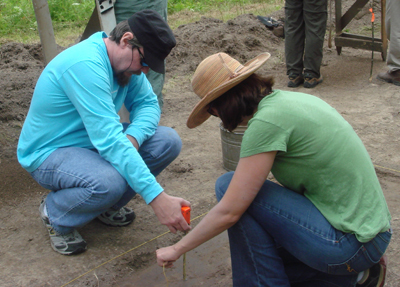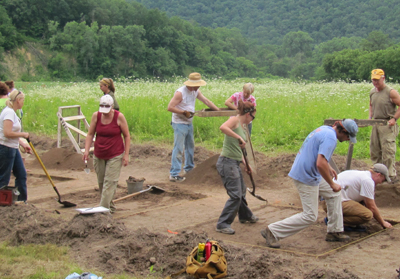Posted 8:25 p.m. Friday, July 29, 2011

 [/caption]
[/caption]
Teachers get hands-on archaeology experience at UW-L
The Amish villages and archaeological sites in southwest Wisconsin’s rolling landscape provide stories that history books just can’t tell. That’s why school teachers from across the country find the Coulee Region a useful place to discover how human cultures have adapted to life over the past 13,000 years. Twenty five K-12 teachers from across the nation attended The National Endowment for the Humanities Summer Institute for Teachers July 11-29, at UW-L. The three-week Mississippi Valley Archaeology Center program was supported by a $139,781 NEH grant. Colleen Connors, a ninth-grade teacher, came from New York City. “I wanted to have a [caption id="attachment_315" align="alignright" width="400" caption="Teachers participate in archeological site excavations and more during the three-week program."] [/caption]deeper understanding of where our country had been, where we are going and explore a part of it I had never seen before,” she explains.
Teachers explored how Native American and Euro-American peoples adapted to the rugged landscape, challenging climate and rich resources of the Upper Mississippi River Valley. They toured an Amish farm, walked in a cave with Native American rock art, and participated in archeological site excavations, among other activities.
“Holding something 1,000 years old in your hand is not something you can do every day,” explains Bob Geiger, a high school teacher in Grafton, Wis.
They learned about how humans continue to adapt even today.
“This will help me explain to students that our understanding of the past is changing,” says Katherine Nesteby, a teacher from Los Angeles. “Just because it says it in the textbook doesn’t mean it is absolutely true. Even now they are making discoveries that change our understanding of the past.”
The tours and field experience helped Connors see her New York City classroom in a new light. When students enter her English as a Second Language class from all over the world this fall — she’ll think about their arrival with a more historical perspective.
“I’m seeing my students more along a continuum that is more than 10,000 years old,” she explains. “How are they going to adapt and what are they going to bring to the greater culture?”
MVAC is an extension of UW-L’s sociology and archaeology department.
Archaeology
The archaeological studies major at UW-L is is one of the few comprehensive undergraduate degree programs in archaeology in the United States and the only one in the Midwest. Students have numerous opportunities to gain hands-on experience in archaeology in the field and in the lab, giving our majors a competitive edge when applying for work or graduate school after completing their bachelor’s degree.
Sociology
The sociology major at UW-L provides students with the requisite research, theory and writing skills for the bachelor’s degree in sociology, while additionally offering the opportunity to take a wide selection of elective courses. Opportunities to engage in undergraduate research and explore career paths through internships and volunteer activities are readily available.
[/caption]deeper understanding of where our country had been, where we are going and explore a part of it I had never seen before,” she explains.
Teachers explored how Native American and Euro-American peoples adapted to the rugged landscape, challenging climate and rich resources of the Upper Mississippi River Valley. They toured an Amish farm, walked in a cave with Native American rock art, and participated in archeological site excavations, among other activities.
“Holding something 1,000 years old in your hand is not something you can do every day,” explains Bob Geiger, a high school teacher in Grafton, Wis.
They learned about how humans continue to adapt even today.
“This will help me explain to students that our understanding of the past is changing,” says Katherine Nesteby, a teacher from Los Angeles. “Just because it says it in the textbook doesn’t mean it is absolutely true. Even now they are making discoveries that change our understanding of the past.”
The tours and field experience helped Connors see her New York City classroom in a new light. When students enter her English as a Second Language class from all over the world this fall — she’ll think about their arrival with a more historical perspective.
“I’m seeing my students more along a continuum that is more than 10,000 years old,” she explains. “How are they going to adapt and what are they going to bring to the greater culture?”
MVAC is an extension of UW-L’s sociology and archaeology department.
Archaeology
The archaeological studies major at UW-L is is one of the few comprehensive undergraduate degree programs in archaeology in the United States and the only one in the Midwest. Students have numerous opportunities to gain hands-on experience in archaeology in the field and in the lab, giving our majors a competitive edge when applying for work or graduate school after completing their bachelor’s degree.
Sociology
The sociology major at UW-L provides students with the requisite research, theory and writing skills for the bachelor’s degree in sociology, while additionally offering the opportunity to take a wide selection of elective courses. Opportunities to engage in undergraduate research and explore career paths through internships and volunteer activities are readily available.